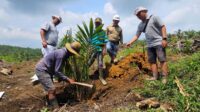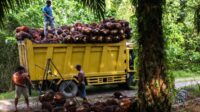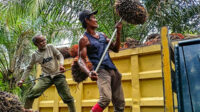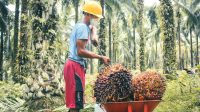PALMOILMAGAZINE, JAKARTA – Efforts to strengthen labor protection in Indonesia’s palm oil sector are once again in the spotlight. The Palm Oil Workers’ Coalition (KBS), representing workers and civil society groups from various palm oil-producing regions, held a dialogue with the Indonesian Palm Oil Association (GAPKI) on Friday, September 12.
The meeting, held in Jakarta, was attended by GAPKI’s Vice Chairman II, Susanto, along with senior officials overseeing human resources and sustainability. From KBS, Coordinator Ismet Inoni led a delegation comprising regional labor representatives and delegates from FNV Netherlands.
During the session, GAPKI reaffirmed its commitment to fostering fairer industrial relations. Representing 749 companies managing a total of 3.9 million hectares, GAPKI outlined concrete measures including compliance with provincial minimum wages (UMP), social security coverage for workers, and guidelines on the protection of women, child labor, and casual workers. “We strive to ensure all members comply with national and international labor standards,” Susanto stated, as reported by beige-heron-208544.hostingersite.comon Monday, September 15, 2025.
However, KBS highlighted persistent challenges, particularly concerning casual day laborers who have worked for years without formal status, severance pay, or retirement benefits. The lack of adequate personal protective equipment (PPE) on plantations also remains a serious concern. “GAPKI member companies must consistently implement labor regulations to ensure workers’ rights are protected,” stressed Ismet Inoni.
In response, GAPKI pointed to ongoing efforts such as intensive training programs for new harvesters and mandatory BPJS social security enrollment. Susanto added that since 2016, many companies have moved away from casual labor systems, though in 2022 a more structured program was introduced for specific cases.
The dialogue also addressed women and child labor protections, which will be further discussed in a joint agenda this coming November. KBS underscored the urgency of strict enforcement on PPE usage and greater labor rights education. Additionally, the coalition is preparing a draft bill specifically for the palm oil sector to serve as a legal framework for worker protection.
Both parties agreed to continue strengthening social dialogue. The meeting is expected to be a stepping stone toward building a fairer and more sustainable palm oil industry, with workers’ rights placed at the forefront. (P2)





































